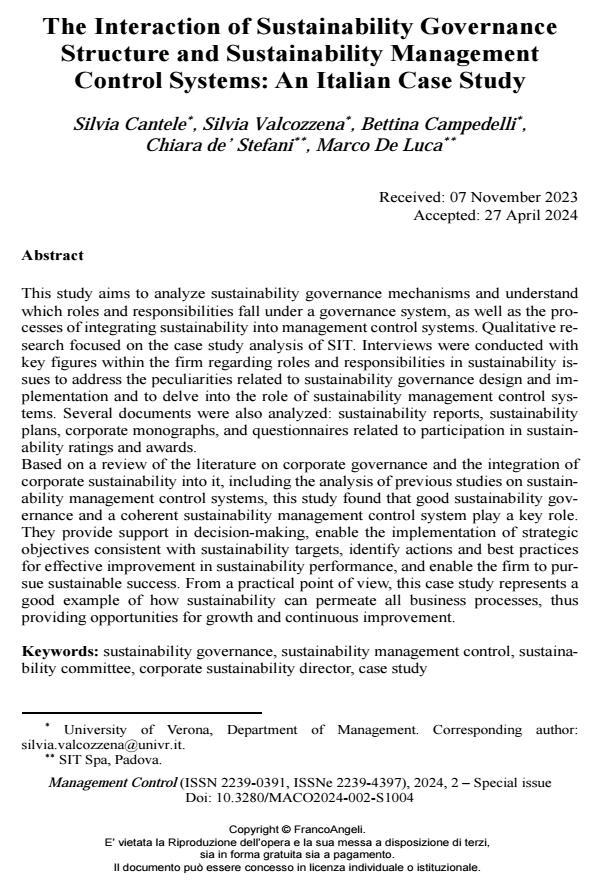The Interaction of Sustainability Governance Structure and Sustainability Management Control Systems: An Italian Case Study
Titolo Rivista MANAGEMENT CONTROL
Autori/Curatori Silvia Cantele, Silvia Valcozzena, Bettina Campedelli, Chiara de’ Stefani, Marco De Luca
Anno di pubblicazione 2024 Fascicolo 2024/2 Suppl.
Lingua Inglese Numero pagine 22 P. 53-74 Dimensione file 314 KB
DOI 10.3280/MACO2024-002-S1004
Il DOI è il codice a barre della proprietà intellettuale: per saperne di più
clicca qui

FrancoAngeli è membro della Publishers International Linking Association, Inc (PILA), associazione indipendente e non profit per facilitare (attraverso i servizi tecnologici implementati da CrossRef.org) l’accesso degli studiosi ai contenuti digitali nelle pubblicazioni professionali e scientifiche.
This study aims to analyze sustainability governance mechanisms and understand which roles and responsibilities fall under a governance system, as well as the pro-cesses of integrating sustainability into management control systems. Qualitative research focused on the case study analysis of SIT. Interviews were conducted with key figures within the firm regarding roles and responsibilities in sustainability issues to address the peculiarities related to sustainability governance design and implementation and to delve into the role of sustainability management control systems. Several documents were also analyzed: sustainability reports, sustainabil-ity plans, corporate monographs, and questionnaires related to participation in sustainability ratings and awards. Based on a review of the literature on corporate governance and the integration of corporate sustainability into it, including the analysis of previous studies on sus-tainability management control systems, this study found that good sustainability governance and a coherent sustainability management control system play a key role. They provide support in decision-making, enable the implementation of stra-tegic objectives consistent with sustainability targets, identify actions and best practices for effective improvement in sustainability performance, and enable the firm to pursue sustainable success. From a practical point of view, this case study represents a good example of how sustainability can permeate all business pro-cesses, thus providing opportunities for growth and continuous improvement.
Parole chiave:sustainability governance, sustainability management control, sus-tainability committee, corporate sustainability director, case study
Silvia Cantele, Silvia Valcozzena, Bettina Campedelli, Chiara de’ Stefani, Marco De Luca, The Interaction of Sustainability Governance Structure and Sustainability Management Control Systems: An Italian Case Study in "MANAGEMENT CONTROL" 2 Suppl./2024, pp 53-74, DOI: 10.3280/MACO2024-002-S1004